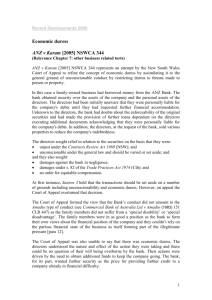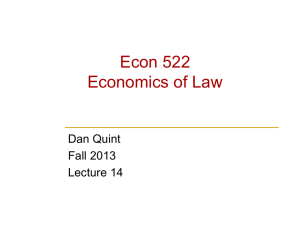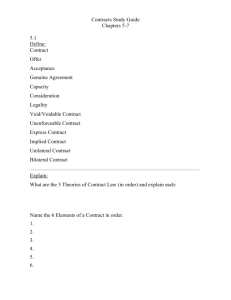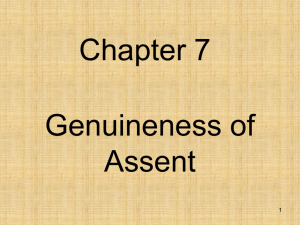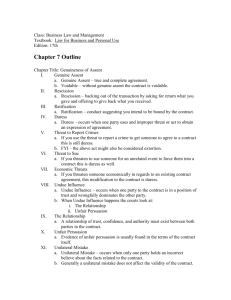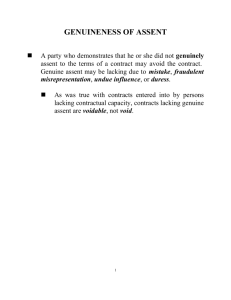October 24, 2013 Mistake Wood v. Boynton (most jurisdictions don't
advertisement
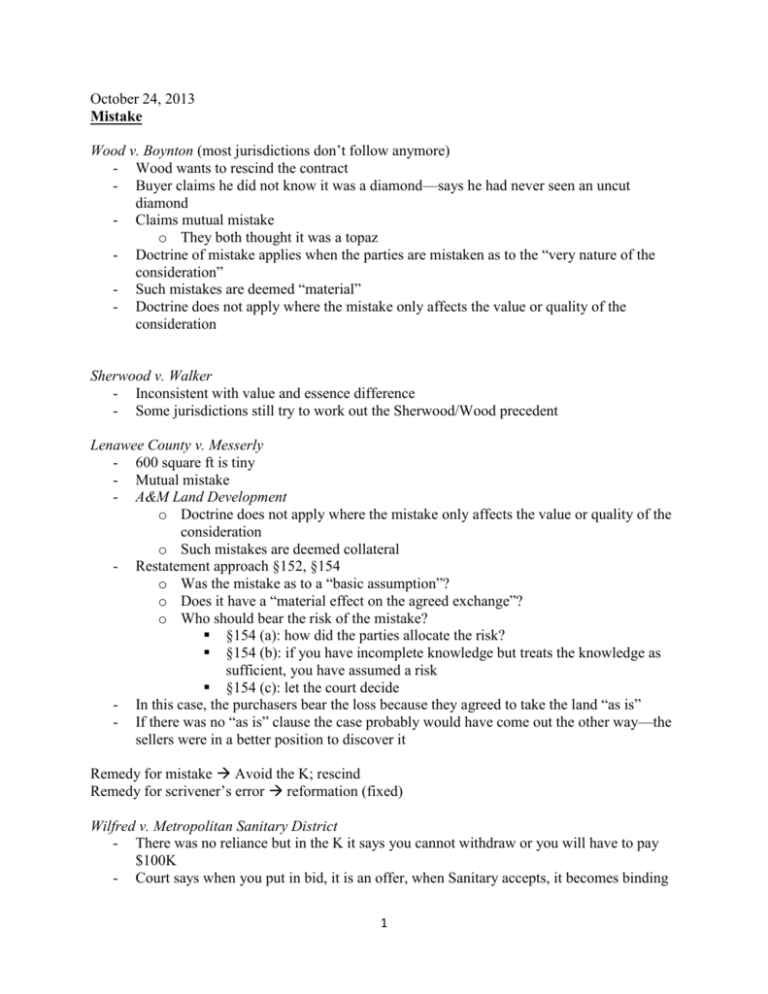
October 24, 2013 Mistake Wood v. Boynton (most jurisdictions don’t follow anymore) - Wood wants to rescind the contract - Buyer claims he did not know it was a diamond—says he had never seen an uncut diamond - Claims mutual mistake o They both thought it was a topaz - Doctrine of mistake applies when the parties are mistaken as to the “very nature of the consideration” - Such mistakes are deemed “material” - Doctrine does not apply where the mistake only affects the value or quality of the consideration Sherwood v. Walker - Inconsistent with value and essence difference - Some jurisdictions still try to work out the Sherwood/Wood precedent Lenawee County v. Messerly - 600 square ft is tiny - Mutual mistake - A&M Land Development o Doctrine does not apply where the mistake only affects the value or quality of the consideration o Such mistakes are deemed collateral - Restatement approach §152, §154 o Was the mistake as to a “basic assumption”? o Does it have a “material effect on the agreed exchange”? o Who should bear the risk of the mistake? §154 (a): how did the parties allocate the risk? §154 (b): if you have incomplete knowledge but treats the knowledge as sufficient, you have assumed a risk §154 (c): let the court decide - In this case, the purchasers bear the loss because they agreed to take the land “as is” - If there was no “as is” clause the case probably would have come out the other way—the sellers were in a better position to discover it Remedy for mistake Avoid the K; rescind Remedy for scrivener’s error reformation (fixed) Wilfred v. Metropolitan Sanitary District - There was no reliance but in the K it says you cannot withdraw or you will have to pay $100K - Court says when you put in bid, it is an offer, when Sanitary accepts, it becomes binding 1 - Liquidated damages are permissible; penalties are not permitted Have liquidated damages clause to deter breach and don’t know what actual damages will be - As long as the guess amount is reasonable then it will be enforced - Wil-Fred’s mistake argument o It was material o Caused by misleading specification o Notice was prompt o Enforcement would be unconscionable - ILLINOIS LAW: o Contract performance is excused if Mistake is material Testimony on materiality contradicted It occurs despite reasonable care Evidence suggests reasonable care Enforcement would have grave consequences and thus it is unconscionable No significant harm to the other party Questionable in Sanitary District case Illinois Law - Materiality - Reasonable care - Grave consequences to be mistaken party - No real harm to other part(ies) vs. R§153 - Basic assumption o Does the mistake go to a basic assumption? - Material effect - Grave consequences make the contract unconscionable OR - Other party knew, had reason to know, or caused the mistake - **No due care requirement stated in §157** October 29, 2013 Syester v. Banta - 68 years old from 1957-1960 - “Plaintiff is a lonely and elderly widow” - Quits after her favorite dance instructor stops teaching there - Using suit to get her money back - Elements of fraud o Misrepresentations (must be material) R§162 o Scienter—knowledge of falsity o Intent to deceive and defraud o Belief and reliance on the misrepresentations 2 - - - o Damage Was there sufficient evidence to support a finding of fraud? o Tells her she is going to be a professional dance o Testifies about the eight good rules for interviewing—prevent prospect from consulting his banker, lawyer, wife or friend as one of the rules o Making up medals and charges for dance lessons o Sold Syester three lifetime memberships o Knew it was false o Syester relied upon it o Seeking to rescind the contract Why not give all the money back o Because she did benefit, she can’t get all the money back because otherwise she would be unjustly enriched Punitive damages—not normally in contract cases, but awarded because fraud is also a tort in addition to breach of contract You can’t always argue punitive damages Hill v. Jones - Termite case - Wants to rescind contract for the house - Claims seller did not disclose material facts - Two types of misrepresentation o Lying o Omission - What kind of information do you have to disclose? o Material—something that would make a difference - There is no duty of good faith in pre-contract negotiations but you still cannot lie or omit material information - Parole Evidence o Exception to integration clause allows evidence to fraud (not true in every state) - Materiality o Anything that if revealed may chance the facts - When is there a duty to disclose under modern contract law? o Necessary to prevent previous assertion from being fraudulent o Necessary to correct a mistaken basic assumption of buyer where failure to disclose would be bad faith o Necessary to correct a mistaken assumption of buyer as to a writing o Based on a relationship of trust and confidence - Are termites material? o Best left to a jury - Can buyers be charged with knowledge because they knew what termite damage looks like? o Best left to jury - The issue may be whether or not the defect was latent o There was evidence of termite damage o Plaintiffs knew what termite damage looks likes 3 Duress Under the Restatement §174, a contract inducted through threat of physical force is void A contract induced through economic duress is voidable R.2d §175(1) Duress consists of an “improper threat” which could be: - a threatened crime or tort or breach of the duty of good faith and fair dealing; - but more generally, it can be anything that results in an exchange of unfair terms **restatement describes duress broadly** Selmer v. Blakeslee-Midwest - Blakeslee was behind in payments all along - Selmer did extra work - Selmer really needed the money so he took the $67K - Is this the kind of offer to deal that we want to discourage because it’s a threat? o Selmer could have walked away o Can’t rip open all contract settlements on that basis—no settlement would be reliable o The Blakeslee of the world wouldn’t settle because people could revive it o Selmers of the world need to be able to settle when they need the money quick - Posner’s view: (not universally accepted) o Settlement should be enforced if allegedly threating party is not the cause of the victim’s economic duress However, this is not necessarily what he decides the case on - P. 109- Georgia Pacific and Capps o Suing for $157K and gives $5K o GP is responsible for Capps bankruptcy o Didn’t dispute that they owed the money - Posner’s rules o Other parties ability to pay o Percentage paid in the settlement o One party responsibility of the other party’s economic distress o Were there other remedies available? Selmer could have walked away from the work but chose not to October 31, 2013 Undue Influence Odorizzi v. Bloomfield - Duress claim o Threat was not unlawful as required for duress under CA law o Threat to pursue legal action is not unlawful unless knowingly false o No real fraud claim here 4 - - - Most states follow restatement—just duress o In most states this was an unlawful threat o Don’t need undue influence except in familial sense Undue influence and duress o Undue influence requires only “over persuasion” i.e. using pressure to take advantage of weakness o Must overcome will but not judgment Grieving, etc o Due to a weakness that does not amount to mental incapacity o Most jurisdictions do fine without undue influence because duress covers the territory o Rare for UI to be the only affirmative defense that makes sense—but the exception is familial matters Public policy o Imagine Odorizzi is an at will employee o Question on homosexuality at public school back then Unconscionability Williams v. Walker-Thomas - Stereo for $514 - Williams is on government assistance o Single mother with seven children - Cross-collateralization o Anything you buy is added to what you already bought o Every new thing is collateralized until your balance goes down to zero - Door-to-door operation (on the day you get your government check) and Walker-Thomas people are also bill collectors - Williams went a 5 year period without repossession - Trial court’s approach o No statutory authority, so no basis to avoid contract for Unconscionability - Skelly Wright—DC Circuit o UCC- persuasive authority o Unconscionability is a common law doctrine, so no statutory basis is required o US Supreme Court has recognized unconscionability that permits equitable remedy in contract o You can fix a contract to remove element of unconscionability o UCC §2-302 recognizes unconscionability in formation—however you cannot rely upon this because it wasn’t in place at the time contract was formed o Remands case Test for unconscionability: - No meaningful choice (procedure) - Unreasonable terms (Substance) o ***in most states, both have to be present** 5 Meaningful choice negated by “gross inequality in bargaining power” - Consider education of parties - “Maze of fine print” - “Deceptive sales practice” Corbinian—substantive unconscionability - Consider in light of the general commercial needs of the particular trade or case - So extreme as to appear unconscionable according to the business practices of the time and place Unconscionability in William case - Was it procedurally and substantively unconscionable? - Substantive—maybe, but who would sell Williams furniture if Walker doesn’t? - Procedural—yes Exercise Six Checklist - Any intent to enter legal relations issue? o No Issue, don’t need to talk about - Any questions of what law applies? o Issue o Perhaps UCC—cell phone o Probably restatement cause of service o But the issue is unconscionability and that operates same in CL and UCC - Any question of formation? o No, don’t need to mention - Any question of promissory estoppel, restitution, etc o No - Interpretation issues—ambiguity, incompleteness o No o No Statute of Frauds or PER - May want to shortly discuss modification The meat of the answer: - Elements of procedural unconscionability (meaningful choice) i.e. deceptive language, door-to-door sales - Elements of substantive unconscionability o Safe to assume that nothing is free o Only $30 o But since nobody is going to initiate an arbitration for that amount, there may be no remedy - Concepcion o Nobody can sue the phone company because most of the time it is little thing and no lawyer will take a $30 claim o They will take a class action o Not one thing alone—no litigation o But when the $30 is combined with a bunch 6 - Possible to reform the contract? o Get rid of no-class-action – can do mass arbitration o Who decides unconscionability? Scalia writing for majority 5-4 Conservative—FAA extremely broadly interpreted because Congress likes arbitration (cheaper, quicker) 7


